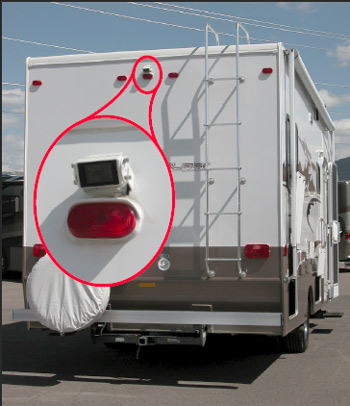Market Search Continued
If the tractor operator could view and adjust the sprayer bar remotely, one person could handle the application. Remote camera systems (figure 7) are common. Inexpensive units are used in motor homes to help drivers back up safely. MTDC did not evaluate this type of system because the Auburn Nursery Co-op members thought the tractor operator would quickly become fatigued from steering the tractor while watching the sprayer's position in a monitor.

Figure 7—A remote camera allows the operator to view the
sprayer operation. These systems are commonly found on
recreational vehicles.
Tractor Toolbar Guidance Systems
Several commercial units are available, including the Navigator (by Automatic Equipment Manufacturing, figure 8), Slide Guide (by Sukup), Buffalo Scout II Shifter guidance system (by Fleischer Manufacturing), and Acura Trak (by Sunco). Some units have several ground sensor options that can provide input to the system.

Figure 8—The guidance system for a sprayer toolbar.
—Courtesy of Automatic Equipment Manufacturing Co.
These systems feature basic remote shutoff, pressure control, and speed control to keep the application rate constant. Raven Industries, Inc., and Midwest Technologies, Inc., make this type of equipment (figure 9).

Figure 9—Automated spray control equipment by
Raven Industries, Inc.
These systems (figure 10) eliminate the need to mix batches of herbicide in large spray tanks. They eliminate the practice of dumping unused mix and the need to clean the mixing tank. Raven Industries, Inc., and Mid-west Technologies, Inc., make this type of equipment.

Figure 10—The SCS Sidekick chemical injection system by
Raven Industries, Inc.—Courtesy of Raven Industries, Inc.
Sensors To Identify Chlorophyll
NTech Industries makes a system (figures 11a, 11b, and 11c) that uses sensors to recognize plants by the presence of chlorophyll. The company was willing to come up with an appropriate hood configuration for the nurseries. These systems spray only when they sense the presence of chlorophyll.

Figure 11a—The WeedSeeker by NTech Industries can recognize
the presence of chlorophyll. The complete system, folded for
transport, is shown here.—Courtesy of NTech Industries

Figure 11b—One of the WeedSeeker's individual spray hoods.
—Courtesy of NTech Industries

Figure 11c—The underside of the
WeedSeeker's spray hoods.
—Courtesy of NTech Industries

